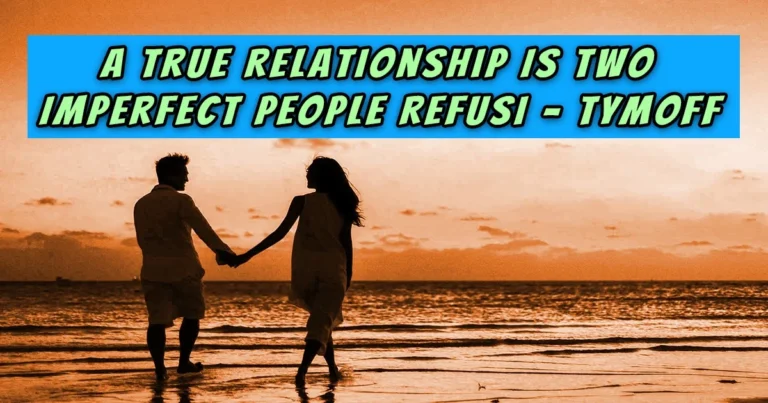Understanding Imperfection in Relationships
Imperfection is an intrinsic part of human nature, which significantly influences the dynamics of relationships. Each individual comes with a unique array of flaws, vulnerabilities, and insecurities that shape their identity. Acknowledging this reality is crucial; after all, a true relationship is two imperfect people refusing to overlook these traits in one another. Acceptance of one’s own imperfections, as well as those of a partner, lays the groundwork for authenticity and deeper connections.
Modern society often cultivates an environment where individuals feel immense pressure to portray themselves as flawless. This phenomenon can lead to the creation of unrealistic standards, causing a disconnect between how one perceives oneself and how one wishes to be perceived by others. The expectations to present perfect versions of ourselves can result in superficiality in relationships and hinder emotional intimacy. The notion that a true relationship is two imperfect people refusing to conform to these societal norms is vital. By embracing vulnerability, individuals can foster a supportive and understanding atmosphere where they can genuinely connect.
Moreover, recognizing and discussing imperfections paves the way for shared experiences and growth. When partners openly communicate about their insecurities or flaws, they humanize each other, allowing for a bond that is built on empathy, rather than pretense. This transparency enables couples to navigate challenges together, leading to resilience and an enriched relationship. Embracing authenticity prompts individuals to explore their true selves, fostering mutual appreciation for one another’s lived experiences. In this light, it becomes evident that accepting flaws within ourselves and others is not only essential but transformative for forging meaningful connections.
The Dynamics of Two Imperfect People Together
The core idea that a true relationship is attributed to two imperfect people refusing, as suggested by Tymoff, resonates deeply when examining the dynamics within partnerships. Relationships often involve a delicate interplay of compromise, empathy, and communication, particularly when both individuals carry their unique sets of flaws and imperfections. Each partner’s understanding and acceptance of these imperfections can significantly enhance the relationship’s resilience and depth.
Compromise is an essential aspect that allows couples to navigate personal differences. When two imperfect people come together, neither partner is entirely right or wrong; rather, they must learn to bend and adapt. For instance, consider a situation where one partner prioritizes social outings while the other prefers quiet evenings at home. Rather than adamantly insisting on their individual preferences, the partners can negotiate a balance, allowing for both social engagement and intimate time together. Such moments of compromise strengthen relational bonds, as they cultivate an environment of respect and shared decision-making.
Empathy is another crucial theme within the dynamics of two imperfect individuals. In recognizing that both partners are flawed, they can approach each other’s shortcomings with compassion. For example, if one partner struggles with anxiety, the other can provide support and encouragement rather than judgment. This empathetic approach not only highlights the strength in vulnerability but also fosters a more profound connection, illustrating that imperfections can be the foundation for mutual support.
Moreover, effective communication is vital to sustain a healthy relationship among imperfect people. Open dialogues about feelings, boundaries, and expectations can address misunderstandings before they escalate. Couples who communicate mindfully can navigate challenges more adeptly, demonstrating that a true relationship is indeed centered around two imperfect individuals who value honesty and respect. Through these dynamics, the imperfections that each partner brings to the table can genuinely enhance rather than diminish their connection.
The Power of Refusing to Settle for Perfection
In contemporary society, couples often feel pressured to attain an idealized version of love and companionship. This pursuit of perfection can inadvertently lead to disappointment and unhealthy dynamics within relationships. A true relationship is two imperfect people refusing to accept the unattainable standards that are often propagated by media and societal expectations. Understanding that imperfections are a natural part of human interaction can lead to more authentic and fulfilling partnerships.

Emphasizing the uniqueness of each partner is vital. Instead of fixating on flaws and perceived imperfections, couples should focus on celebrating what makes them different. This shift in perspective allows individuals to appreciate their partner’s strengths while acknowledging that neither is perfect. By refusing to settle for an ideal, couples can foster a nurturing environment where they feel valued and understood. Regularly expressing appreciation for each other’s individuality contributes to a more robust relationship foundation.
Moreover, cultivating open communication is essential in any relationship. Partners should feel safe to express their thoughts and feelings without the fear of judgment or rejection. Discussing insecurities and vulnerabilities candidly enables couples to support one another more effectively. This mutual support breeds growth, reinforcing the idea that a true relationship is built on acceptance and teamwork rather than competition or comparison.
Additionally, it can be beneficial to set realistic expectations for the relationship. Accepting that challenges will arise, and that disagreement is a natural part of partnership, helps couples navigate difficulties without losing sight of their shared goals. By cultivating patience and understanding towards themselves and each other, partners can genuinely embrace each other’s imperfections. Ultimately, a successful relationship thrives on this commitment to growth and understanding, confirming that a true relationship is indeed two imperfect people refusing to settle for anything less than genuine love and companionship.
Embracing Growth and Acceptance in Relationships
In any meaningful partnership, the journey is not merely about finding a “perfect” match but rather about embracing the imperfections that each person brings to the table. A true relationship is two imperfect people refusing – Tymoff, to succumb to the ideal that they must change entirely to make the relationship work. Rather, this dynamic serves as a valuable opportunity for both parties to grow, learn, and evolve alongside one another.
Relationships fundamentally act as mirrors, reflecting not only our strengths but also our flaws. By acknowledging these characteristics, partners can cultivate an environment that promotes growth. This mutual understanding allows individuals to confront their shortcomings and improve, thus enabling the relationship to flourish. It is essential to understand that acceptance of imperfections does not equate to complacency; instead, it embodies a commitment to support each other in overcoming challenges.
As two individuals navigate their journey together, embracing imperfections fosters compassion and resilience. During tough times, it is crucial to maintain patience and understanding, recognizing that change is an inevitable part of life. Partners should strive to create a safe space where they can openly discuss their feelings, fears, and aspirations. This open dialogue not only reinforces the strength of their bond but also serves to strengthen their individual selves, allowing for holistic growth.
Ultimately, building a lasting relationship hinges on the ability to accept and appreciate one another’s flaws. By doing so, partners pave the way for personal development, which positively contributes to the overall health of the relationship. As both individuals continue to adapt and evolve, their commitment to each other can deepen, reinforcing the idea that a true relationship is two imperfect people refusing to let their imperfections dictate their happiness together.
May Be You Also Read

